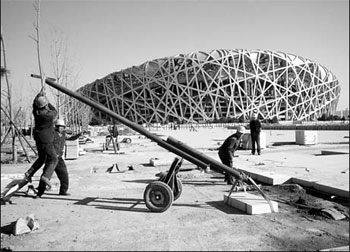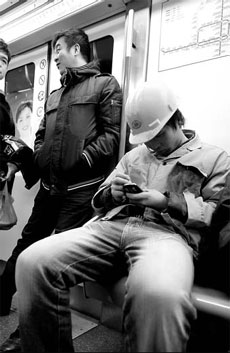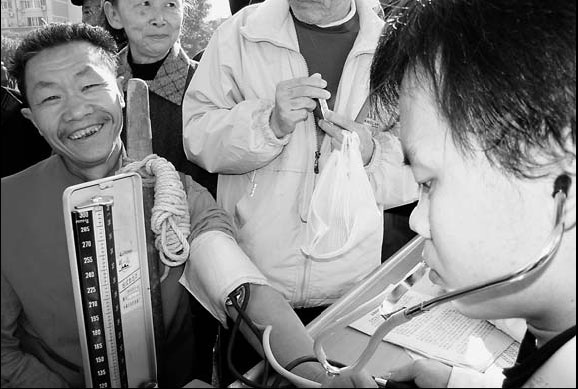Learning on the job
|
Workers at the Multipurpose TV Tower, near the National Stadium. Wu Changqing |
Wang Zehao came to Beijing a year ago to work at a construction site near the southeastern Second Ring Road. The 19-year-old works the day shift, 12 hours a day, seven days a week.
Back in his hometown of Puyang, a city in Central China's Henan Province, he delivered goods from wholesalers to retailers. "I used to carry boxes of milk, but now I move iron bars," he says.
Though his work is more labor intensive than before, Wang does not intend to make any changes.
|
Workers lay marble slabs outside the National Stadium. Gong Wenbao |
"Migrant workers spend more time in cities than in their hometowns," says Zhou Keqiang, principal of the Chongwen Community and Adult College. These workers are losing their identities as farmers, but becoming more like city workers and dwellers, Zhou says.
The main attraction for farmers in cities is higher income, Zhou says. While younger migrant workers get used to urban life and tend not to go back home, the senior workers prefer moving home when they are too old to work.
In Beijing, migrant workers account for more than 90 percent of the construction industry workforce. And 60 percent of them are in their 30s, according to a report on migrant workers issued by the State Council.
Besides higher income, city life also offers more attractions. During the day, Wang Zehao reinforces iron at the pit. In the evening, when he is off duty, he likes to surf the Internet. Like other young men his age, he enjoys playing online games and chatting online. "I play Eudemons Online and Popkart Crazy Racing very well. My friends all think so," says Wang, grinning with pride.
Wang has many friends online. "We know each other via QQ and chat online regularly," he says. At the construction site, most of the workers are older than him, with different backgrounds and experiences.
"I want to talk with people my age who have similar interests," Wang says.
Among Wang's senior colleagues is Zhang (who declined to give his full name) who has worked more than two decades as a construction worker in Beijing. He spends only about 20 days a year with his family in Baoding, Hebei Province. Telephone is the only way to keep contact with them. "I am going home for New Year. Perhaps I can stay for a whole week," Zhang says.
He has three children, two of whom are still at school. Over the years, his wages have helped them get an education. Zhang speaks proudly of his 17-year-old son who is a good student.
"All my efforts are worth it as my elder son does well in class," he says.
The second year high school student is in the top five of his class. In July this year, his son came to Beijing with his teacher and classmates to visit China's top universities.
"His teacher thinks he can be accepted by key universities through the national exam. Whatever it takes, I will support him. I hope he can go to a university in Beijing," Zhang says.
|
A migrant worker sends mobile messages. Xie Yuan |
Yang Fa recently took his two sons away from their hometown of Yancheng, in East China's Jiangsu Province. The three now work at the same construction site in Beijing. Yang earns 1,800 yuan ($240) a month in his current job.
"The pay is better in Beijing. So I want my boys to work here," he says.
Most young migrant workers work on construction sites while their peers in cities are still at school.
"They work in Beijing, and for Beijing. We should provide them with opportunities for schooling," Zhou Keqiang says.
In June this year, Chongwen Community and Adult College began to support the Hongshan Garden Evening School for Migrant Workers initiative, providing teaching resources.
Hongshan Garden Evening School is a non-profit project, established by Chongwen District Construction and Development Company, at which migrant workers can receive free education. It is the biggest such facility in Beijing, with three multi-media classrooms, holding up to 900 people. The school is also equipped with libraries, computers and lounges for board games.
Wang Jianrong, director of the training department at Chongwen Community College, says the courses are designed for migrant workers.
"We invite professionals and experts to deliver lectures on work safety at construction sites, food safety and knowledge of the Olympics."
Various teaching resources, such as video clips, are used to make the courses more appealing to migrant workers. The school also organizes sports activities, with the game times shortened so more people can participate.
Around 7 pm, the day shift migrant workers are off duty. Wang Zehao takes off his work clothes, and puts on a pair of jeans and a jacket.
"I am young, so I want to see more of the big city. I wish to stay here."
|
A worker has his blood pressure measured on "Migrant Workers' Day", celebrated in Chongqing in November. Rao Guojun |
(China Daily 12/27/2007 page20)


















